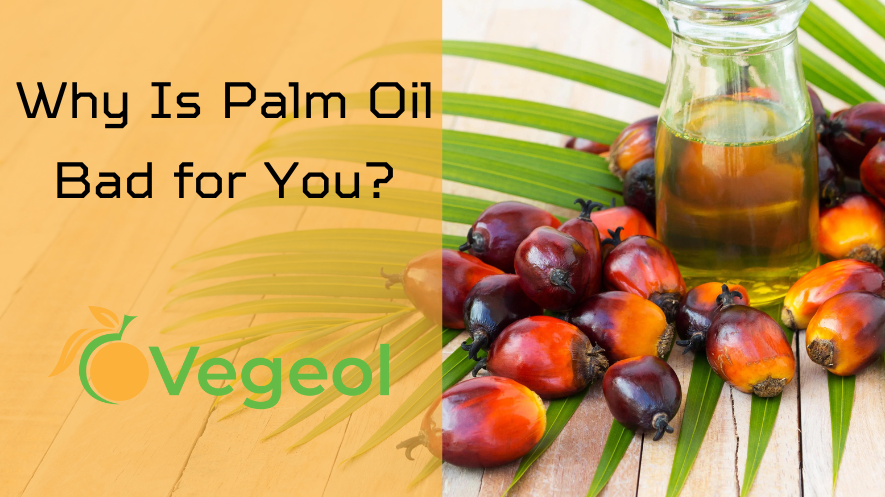Seed oils are popular in cooking today. They’re light and can take the heat, so they’re used in recipes like stir frys.
They’re also high in omega-6 fats. And if they’re refined, they may be low in vitamin E, which many of us need to meet our recommended daily allowance.
1. They are rich in linoleic acid
Seed oils are rich in linoleic acid, also known as omega-6. The omega-6 fats in seed oils are converted to inflammatory compounds such as arachidonic acid and may contribute to a wide range of conditions including heart disease, cancer, autoimmune diseases, depression and diabetes [*]. Critics claim that eating a significant amount of linoleic acid will boost inflammation throughout your body and lead to a variety of health problems. However, this isn’t supported by the research and the evidence shows that consuming linoleic acid doesn’t cause chronic inflammation in humans.
Seed oil critics often point to studies that show linoleic acid increases inflammation in mice and rats, but these lab tests are not the same as human studies. The inflammation caused by linoleic acid in humans is not the same as the inflammatory process that causes heart disease.
While there are concerns about consuming too much omega-6 fats, a lot of the other fears about seed oils are not true. For example, seed oils are rarely used in whole foods and are most commonly found in processed foods and restaurant meals. It’s not easy to eliminate them completely because they are in so many products, but reducing the amount of seed oils you consume by learning how to meal prep and asking questions at restaurants can make a big difference.
Seed oils are also often used to make ultra-processed foods such as fast food burgers and fries, packaged cookies, crackers and breads, frozen dinners and packaged salad dressings. This means they are exposed to high heat and repeated use, which can lead to the formation of harmful byproducts such as acrylamide, aldehydes and hydroxylinoleate, especially when these oils are reused hundreds of times.
2. They are high in antioxidants
Seed oils include canola (also known as rapeseed in the UK), sunflower, soybean, cottonseed, corn, safflower and rice bran. They are a common ingredient in packaged snacks, fast food, restaurants and even baby formula.
Many people are outraged about these industrial oils, claiming they’re toxic and should be avoided completely. They claim that these oils increase your risk of heart disease, weight gain and more. But is this really the case? To start with, it’s important to remember that toxicity isn’t just about the quantity of a substance you consume. It also depends on the concentration and duration of exposure. For example, artificial trans fats can be toxic because they increase your risk of heart disease and can even lead to death. But this only happens if you eat them regularly for an extended period of time.
Most of the concern about seed oils comes from their high omega-6 fatty acid content. In a typical American diet, this can throw off the body’s ratio of omega-6 to omega-3 fatty acids and cause inflammation. This is why the haters of seed oils say it’s best to avoid them altogether, or only use them very sparingly.
However, Zumpano warns that banning all seed oils may be a bit extreme. Instead, he suggests that focusing on eliminating processed foods from your diet first would be the more beneficial move. This will naturally cut down on the amount of seed oils you eat and give you some leeway when eating out or at social gatherings. This is especially important because the dietary guidelines currently recommend that most Americans should be consuming up to 30% of their calories from vegetable oil-based foods.
3. They are good for your heart
Some people argue that seed oils, particularly those containing linoleic acid, are toxic and contribute to chronic inflammation. They point to research suggesting that excess linoleic acid is converted in the body to arachidonic acid, which has been linked to inflammation and disease. But, the evidence supporting this claim is inconclusive. In addition, reducing linoleic acid intake doesn’t seem to affect the amount of arachidonic acid in your body (the conversion happens in the liver).
The good news is that there are plenty of ways to get your linoleic acid without the risk of harmful oxidized oil. There are a wide variety of healthy foods that contain this fatty acid, including peanut butter, sunflower seeds and whole grains. Plus, you can use a heat-stable cooking oil, such as Zero Acre, that is naturally low in linoleic acid and high in antioxidants.
Even though industrial seed oils like canola, safflower, soybean, and corn are refined, they still have a lot of linoleic acid. These oils are typically used in processed packaged foods, fast foods and eating out, so they’re hard to avoid completely. But, there are lots of other options for healthy cooking oil that are more stable at higher temperatures and don’t produce oxidized linoleic acid.
Eliminating the use of seed oils can help reduce your overall dietary omega-6 intake, which may benefit your heart health. But it’s important to remember that the benefits of a diet rich in unprocessed whole foods are more significant than eliminating the occasional use of these fats, regardless of how they are prepared. In fact, many of the same people who say they feel better after stopping the use of seed oils are also eating fewer processed foods in general and losing weight, which can be a win for your health, too!
4. They are high in monounsaturated fats
Seed oils are high in monounsaturated fats, which are also known as heart-healthy fats. In fact, most oil-rich foods contain a combination of polyunsaturated and monounsaturated fats to varying degrees. However, some people suggest you should avoid seed oils because they are primarily composed of a type of polyunsaturated fat called omega-6s. The body converts omega-6s into inflammatory compounds that can lead to chronic disease.
This is true, but it’s important to understand that the problem is not with linoleic acid or omega-6 fats per se. The issue is that industrial processing turns these healthy fats into unhealthy ones. When unsaturated fats are heated up over and over again, they create harmful chemical byproducts like oxidized linoleic acid and a variety of other inflammatory compounds.
The good news is that this can be avoided by using cold-pressed or expeller-pressed oils, which are minimally processed and often have a better nutritional profile than conventional cooking oils. But the biggest issue is that industrial seed oils are found in most packaged processed foods, fast food and restaurants, so avoiding them could involve learning to cook at home or asking lots of questions when eating out.
Many people have seen social media posts that show graphs with the rise of chronic disease and the rising use of seed oils. But these are usually correlational studies and don’t prove causation. In addition, the early research on linoleic acid and cardiovascular disease was conducted during a time of minimal food regulation and focused on whether it was being labeled correctly—not whether the fat itself might be harmful in a high-dose situation. It isn’t until decades later that we have more balanced, objective safety research to look at the relationship between a high linoleic acid diet and cardiovascular disease.
5. They are good for your skin
Many clean beauty products contain seed oils, like safflower oil, soybean oil, sunflower oil and corn oil. But these seed oils have been industrially processed and have a very high omega-6 content, which can be harmful for the skin. But unrefined, organic or wild-sourced seed oils are good for the skin, nourishing it with vitamin E and antioxidants. They are also very stable, meaning they can be heated and will not go rancid.
Zumpano says that limiting industrial seed oils and focusing on whole foods, especially healthy fats from fruits and vegetables, is still the best way to keep your skin looking radiant. She advises to use alternative cooking oils that are high in heart-healthy monounsaturated fats and have a lower omega-6/omega-3 ratio, such as avocado oil or olive oil.
She adds that it is important to eliminate ultra-processed packaged and fast foods, as they often contain seed oils, and avoid eating out at restaurants where most cooks use cheap cooking oils. She also advises to ask your grocer or restaurant chef about the cooking oils they use and how they are refined.
While Zumpano says that avoiding all seed oils and linoleic acid is the best option, she understands that it is not realistic for everyone to do so completely. The most important thing to remember is that when it comes to seed oils and linoleic fatty acids, it is all about how they are used, rather than what type of fat they are. It is essential to choose wholesome, real foods that are naturally low in omega-6 fatty acids and to limit inflammation by keeping your linoleic acid intake between 6-8% of total calories.


